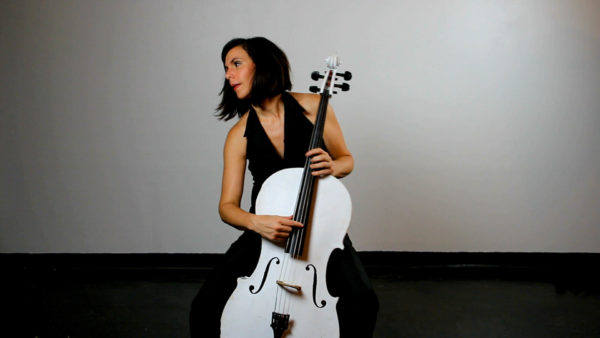Music Preview: Cellist Helen Gillet — Blending Chaos and Creativity
“If it wasn’t for mistakes or the mutations that happen as part of being an organic, living, breathing creature on this planet we wouldn’t have the variety of life that we have on this earth.” – Helen Gillet.
Helen Gillet, with Matthieu Saglio and Rufus Cappadocia at the Boston Conservatory Theater, 31 Hemenway St., second floor, Boston, MA on June 21 at 7:30 p.m.

Cellist Helen Gillet — no longer working to prove herself as a woman artist. Photo: courtesy of the artist.
When cellist-singer-composer Helen Gillet headlines a three-cello concert at the Boston Conservatory Theater next week, as part of Berklee’s New Directions Cello Festival, the audience can expect three things: complex though irresistibly catchy songs, loops that allow the solo artist to build walls of sound, and mistakes. The latter because the composer of such haunting tunes as “Julien” and the intricate pizzicato counterpoint of “Vautour” welcomes the happy accident as part of each performance.
“The chaos factor of a mistake is an important element to unlock something that you would never have thought of,” explains Gillet, who comes to Boston from New Orleans. “Embracing the chaos and the unknown is a part of being a creative person.”
Creative Gillet certainly is: the Belgian-born artist melds her classical training with serious improv chops, all the while wielding foot-pedal looping technology. But, watching her build a song onstage, it’s hard to see her as anything but in complete control. Often she’ll start with a bowed melody – something vaguely melancholy, perhaps reminiscent of the French chanson she grew up with. Percussive hand slaps against her instrument’s hollow body may follow, or the soft sliding rub of her palm on the wood, which, looped, form a rhythmic base for pizzicato and more bowing and her deep vibrato-laced vocals, all building to complex harmonies replete with the rhythmic variations one expects from a New Orleans-based artist.
But even over the looped polyrhythms, variation – “the chaos factor” – comes into play. “You can think about it like funk bands,” says Gillet, who has worked with artists ranging from Cassandra Wilson to Mardi Gras Indians. “A lot of songs are very repetitive in form and structure. We enjoy things that repeat so that we can notice the differences when they happen,” she explains.
Based, since 2003 in the Crescent City, the Belgian musician identifies — and frequently collaborates –- with jazz musicians in her hometown. However, her journey into improvisation began in Wisconsin. A student at Beloit College, Gillet was performing with the Beloit Janesville Symphony Orchestra when she was introduced to Nancy Lesh, a cellist and specialist in North Indian Hindustani music, who was then living in Madison. Lesh brought her into the world of ragas, which rely on improvisation. That set her on a path into free jazz, where she discovered “there are no mistakes. Everything that you’re doing is something that’s contributing to the next thing you’re going to create.
“I’m very organic when I’m performing now and I’m just in the moment,” says Gillet. “I am thinking about certain things being a certain way but inevitably my hand may drum on the cello a little bit differently, or my strings might be getting a little older so they’re duller and something happens that I wasn’t expecting and a new rhythm will pop out. A new set of harmonics will be looped. And I live for that, for those moments where it kind of fits together in a way that then unlocks a different rhythmic pattern.”
The undeniable pop sensibility in Gillet’s music — catchy hooks and all — represents another loop: the artist circling back to her roots. After spending her 20s “trying to be a jazz dude,” as she puts it, “when I turned 30 something happened.”
For Gillet, now 40, that had to do with realizing she no longer had to work so hard “proving myself as a woman artist.” Stylistically, after a decade exploring jazz, that meant reclaiming her earlier love of pop, funk, and punk artists, from X-Ray Spex to PJ Harvey (whose “Angelene” she regularly covers) and Joni Mitchell to Jeff Buckley, as well as the Belgian artists like George Brassens (whose sly “Le Pornographe” highlights her French-language Dusk in Wallonia CD), who she regularly covers with her francophone side project Wazozo.
“I grew up listening to a lot of beautiful songs that were more poppy and folky,” says Gillet. “With Prince in my ears all the time.”
“Maybe this is a rite of passage that a lot of people go through,” she muses. “Where I just became truer to who I was.”
The result is music that welcomes loops of all sorts and plays with the happy accidents that create new melodies and rhythms that reach beyond borders.
“I sort of let my hair down, so to speak,” says Gillet. “And became truer to the music that truly moves me.”
A former journalist, Clea Simon is the author of three nonfiction books and 26 mysteries. A contributor to such publications as the Boston Globe, New York Times, and San Francisco Chronicle, she lives in Somerville with her husband, Jon Garelick. She can be reached here and on @Clea_Simon.
